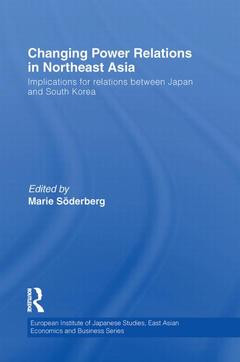Changing Power Relations in Northeast Asia Implications for Relations between Japan and South Korea European Institute of Japanese Studies East Asian Economics and Business Series
Coordonnateur : Soderberg Marie

This book analyses the Japanese-South Korean relationship from various angles including politics, security, economics, culture and immigration. In a sense the two countries are natural partners. Both are democratic societies, they are economically strong and are the only two Asian countries that are members of the OECD. Both have security treaties with the USA, they share security concerns when it comes to the North Korean nuclear threat as well as the rise of China, which at the same time has become the largest trading partner for both. Japan and South Korea also share similar values, customs, cultures and languages. All this would make it logical for them to have a strong cooperative bilateral relationship. Yet this is still not the case. The contributors to this book examine how the relationship is affected by the changing power relations in Northeast Asia and find a most complex situation.
Understanding how Japan and Korea interact is central for anyone that wants to understand the politics of East Asia. This volume will be of huge interest to students and scholars of Asian politics, as well as those interested in political science and peace and conflict resolution more generally.
Marie Söderberg is Professor and Director of the European Institute of Japanese Studies, Sweden.
1. Introduction: Japan–South Korea relations at a crossroads, Marie Söderberg 2. How can we cope with historical disputes? The Japanese and South Korean experience, Kan Kimura 3. A whirlpool of historical controversies in widening waters of cooperation, Cheol Hee Park 4. Japan and the two Koreas: the foreign policy power of domestic politics, T. J. Pempel 5. Historical memory versus democratic reassurance: the security relationship between Japan and South Korea, Paul Midford 6. Hallyu: new politico-cultural discourse in East Asia? Ingyu Oh 7. Lingering memory problems: compromising hearts and resentful resistance, Mikyoung Kim 8. Substituting multilateralism, guiding trilateralism: the Japan–ROK Investment Agreement in the growing East Asian regionalism, Yoichiro Sato 9. The struggle for a decent life in Japan: the Korean minority adapting to changing legal and political conditions, Marie Söderberg 10. A multilayered analysis of Japan–South Korea relations, Marie Söderberg
Marie Söderberg is Professor and Director of the European Institute of Japanese Studies, Sweden.
Date de parution : 05-2013
15.6x23.4 cm
Date de parution : 12-2010
15.6x23.4 cm
Thème de Changing Power Relations in Northeast Asia :
Mots-clés :
south; korea; korean; asian; community; kim; il-sung; peninsula; democratic; party; Militarized Interstate Dispute; Kim Il Sung; South Korean; Japanese Prime Minister Yukio Hatoyama; Abduction Issue; Japan ROK Relation; Japanese South Korean Relations; DPJ Government; Takeshima Islets; Takeshima Issue; Comfort Women Issue; Japan South Korea Relations; Smoother Relations; Murayama Government; Historical Disputes; Japanese Middle Aged Women; Trilateral Investment Agreement; Young Men; Investment Agreement; Special Permanent Residents; China ASEAN Agreement; Historical Reassurance; Chongryun Koreans; Hiroshima Peace Memorial Museum; Northeast Asia History Foundation



